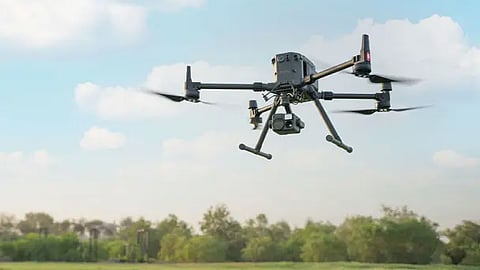FEDS: Drones are the Key to Unlocking a Net Zero Future
Drones are a critical component in the global movement to achieve net zero carbon footprint and a sustainable future for all, FEDS Drone-powered Solutions (FEDS) CEO and Founder Rabih Bou Rached, has announced.
Drones are already seen as powerful tools in use cases such as search and rescue, construction inspections, agriculture, energy, as well as delivery and logistics.
However they can also be a significant ally to companies aiming to reduce their carbon footprints, as they offer; enhanced data-gathering and analysis, enable organizations with improved resource efficiency, and use little energy themselves.
Achieving an energy-sustainable future calls for the cautious consumption of natural resources and significant reduction of greenhouse gas emissions (GHGe) across sectors.
ADNOC Partners with EDGE to Use UAE-Made Drones to Minimize Emissions
The path to net zero is fraught with several issues, the most challenging of which is the capital investment required. According to a McKinsey & Company report, achieving net zero by 2050 requires US$275 trillion in cumulative spending on physical assets, which is approximately $9.2 trillion per year between 2021 and 2050.
That figure is US$25 trillion over what current policies outline. Taking this data into account, along with increasing instances of climate disasters that are reversing global development at staggering rates, it is vital to utilise every tool in the pursuit of decarbonisation and a sustainable future.
Bou Rached explained: “Drone technology has already begun transforming several industries, and we are already on a path to achieve net zero.
"There are myriad examples where drones have aided sustainability efforts and, as technology evolves, we are confident they will increasingly be seen as the tool of choice to achieve sustainable ambitions.
"Sustainability is one of FEDS’ core values, and we look forward to working with organisations that have a goal to achieve net zero on schedule, efficiently and economically.”
As an environmentally friendly tool, drones allow organisations to make potent changes. Such a capable tool has the ability to capture rich field data efficiently, thus enabling companies to make data-driven decisions. Gathering data was somewhat arduous previously, coupled with accuracy challenges, and possibly danger.
In such cases where crewed planes were used to survey remote locations or large portions of land, the use of fuel also negatively impacted sustainable goals, with jet fuel being an atmospheric pollutant.
The agriculture sector contributes significantly to global emission levels, and with the global population continuing to grow, this sector will have to expand to meet demands, while reducing its impact on the environment.
The agriculture industry is already attached to a number of unsustainable practices, including the overuse of land, pesticides and fertilisers. One of the solutions proposed for agriculture's inefficient resource use is precision agriculture.
Offsetting emissions is another crucial component in the decarbonisation transition and, in the long term, to actually become carbon negative.
Drone technology can aid in the offsetting of emissions via a number of different processes: sustainable logistics, reforestation, and the detection of methane in landfills and/or waste-to-energy plants.
Delivery drones can enable organisations and service providers to noticeably reduce their environmental impact compared to fossil-fuel-driven fleets.
General logistics and/or cargo drones can be leveraged to transport goods from docks to fulfilment areas or even between warehouses. By using these drones, organisations can save money, resources and reduce their overall carbon footprint.
A further area where drones can have a significant positive impact is the management of landfills and advanced waste-to-energy facilities.
Studies have revealed that 50% of the gas released at landfills is methane, which is 25 times more potent than carbon dioxide when it comes to trapping heat.
It’s clear that drones can play a central role in creating a sustainable future across a multitude of industries and as technology evolves, newer usage cases will emerge and showcase drone technology as the strongest ally in the battle to achieve net zero.
Read More: Aramex Announces Successful Testing of Drone and Robotic Delivery Service in UAE


